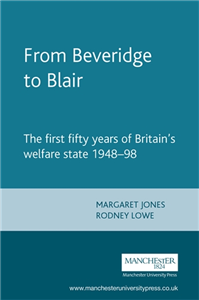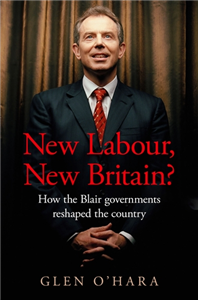Your Search Results
-
Promoted Content
-
Promoted ContentHumanities & Social SciencesNovember 2013
Britain and Africa Under Blair
In pursuit of the good state
by Julia Gallagher
Africa was a key focus of Britain's foreign policy under Tony Blair. Military intervention in Sierra Leone, increases in aid and debt relief, and grand initiatives such as the Commission for Africa established the continent as a place in which Britain could 'do good'. Britain and Africa under Blair: in pursuit of the good state critically explores Britain's fascination with Africa. It argues that, under New Labour, Africa represented an area of policy that appeared to transcend politics. Gradually, it came to embody an ideal state activity around which politicians, officials and the wider public could coalesce, leaving behind more contentious domestic and international issues. Building on the story of Britain and Africa under Blair, the book, now available in paperback, draws wider conclusions about the role of 'good' and idealism in foreign policy. In particular, it discusses how international relationships provide opportunities to create and pursue ideals, and why they are essential for the well-being of political communities. It argues that state actors project the idea of 'good' onto idealised, distant objects, in order to restore a sense of the 'good state'. The book makes a distinctive and original contribution to debates about the role of ethics in international relations, and will be of particular interest to academics, policy-makers and students of international relations, Africa and British foreign policy, as well as anyone interested in ethics in international affairs. ;
-
 Trusted Partner
Trusted Partner
-
 Trusted Partner
Postwar 20th century history, from c 1945 to c 2000July 2013
Trusted Partner
Postwar 20th century history, from c 1945 to c 2000July 2013The Blair identity
by Stephen Benedict Dyson
-
 Trusted Partner
Trusted Partner
-
 Trusted Partner
Humanities & Social SciencesJuly 2002
Trusted Partner
Humanities & Social SciencesJuly 2002From Beveridge to Blair
The first fifty years of Britain's welfare state 1948–98
by Harry Bennett, Margaret Jones, Rodney Lowe
The creation of Britain's welfare state in 1948 was an event of major international importance. Designed to provide a concise introduction to the evolution of both the structure of the welfare state and attitudes towards it. Concentrates on five core services: health care, education, social security, the personal social services and housing. For each service it examines the original vision, the attempts to implement this vision, the resulting complexities and controversies and, above all, the impact on individual 'customers'. A wide range of documentary evidence is used, including published and unpublished government sources, political memoirs, newspaper exposés and personal testimony. ;
-
 Trusted Partner
Trusted Partner
-
 Trusted Partner
November 2025
Trusted Partner
November 2025Farm der Tiere
Ein Märchen | Sie wollten Freiheit. Sie bekommen Unterdrückung | Der Klassiker über Macht, Manipulation und Moral neu übersetzt von Eike Schönfeld
by George Orwell, Eike Schönfeld
Eine Farm. Eine Revolution. Ein Traum von Freiheit, der in Diktatur umschlägt. Die Tiere auf der Farm des Säufers Mr Jones werden vernachlässigt, ausgebeutet und misshandelt – bis sie eines Tages beschließen zu rebellieren. Die Intelligentesten unter ihnen, die Schweine, führen den Aufstand an, vertreiben den menschlichen Peiniger und stellen neue Regeln für das Zusammenleben auf: Alle Tiere sind gleich! Ein glückliches Leben scheint bevorzustehen, doch allmählich bilden sich neue Machtstrukturen heraus … und aus ehemals Unterdrückten werden neue Gewaltherrscher. George Orwells dystopischer Roman von 1954 ist erschreckend aktuell – und dabei in zeitgemäßer Neuübersetzung so zugänglich wie nie. In einer Welt voller Fake News, Filterblasen und Führungsversagen hält Orwell uns den Spiegel vor. Ein Kompass für kritisches Denken mit Witz, Biss und bedrückender Klarheit.
-
 Trusted Partner
The ArtsJanuary 2019
Trusted Partner
The ArtsJanuary 2019The war that won't die
The Spanish Civil War in cinema
by David Archibald
The war that won't die charts the changing nature of cinematic depictions of the Spanish Civil War. In 1936, a significant number of artists, filmmakers and writers - from George Orwell and Pablo Picasso to Joris Ivens and Joan Miró - rallied to support the country's democratically-elected Republican government. The arts have played an important role in shaping popular understandings of the Spanish Civil War and this book examines the specific role cinema has played in this process. The book's focus is on fictional feature films produced within Spain and beyond its borders between the 1940s and the early years of the twenty-first century - including Hollywood blockbusters, East European films, the work of the avant garde in Paris and films produced under Franco's censorial dictatorship. The book will appeal to scholars and students of Film, Media and Hispanic Studies, but also to historians and, indeed, anyone interested in why the Spanish Civil War remains such a contested political topic.
-
 Trusted Partner
The ArtsJune 2021
Trusted Partner
The ArtsJune 2021The war that won't die
The Spanish Civil War in cinema
by David Archibald
The war that won't die charts the changing nature of cinematic depictions of the Spanish Civil War. In 1936, a significant number of artists, filmmakers and writers - from George Orwell and Pablo Picasso to Joris Ivens and Joan Miró - rallied to support the country's democratically-elected Republican government. The arts have played an important role in shaping popular understandings of the Spanish Civil War and this book examines the specific role cinema has played in this process. The book's focus is on fictional feature films produced within Spain and beyond its borders between the 1940s and the early years of the twenty-first century - including Hollywood blockbusters, East European films, the work of the avant garde in Paris and films produced under Franco's censorial dictatorship. The book will appeal to scholars and students of Film, Media and Hispanic Studies, but also to historians and, indeed, anyone interested in why the Spanish Civil War remains such a contested political topic.
-
 Trusted Partner
Trusted Partner
-
 Trusted Partner
November 2020
Trusted Partner
November 2020Dark
Thriller
by Candice Fox, Andrea O’Brien
Eine verurteilte Mörderin. Eine talentierte Diebin. Eine skrupellose Gangsterin. Eine desillusionierte Ermittlerin. Zusammen sind sie die einzige Hoffnung eines vermissten Mädchens. Los Angeles. Dayly, die Tochter der unverbesserlichen Diebin Sneak Lawlor, ist verschwunden. Sneak bittet ihre ehemalige Zellengenossin, die wegen Mordes verurteilte und gerade entlassene Ärztin Blair Harbour um Hilfe. In ihrer Not wenden sich die beiden Frauen auch an die Polizistin Jessica Sanchez, die gerade ein 7-Millionen Haus geerbt hat und von ihren Kollegen deswegen gehasst wird. Und weil die Spur der wie vom Erdboden verschluckten Dayly ins kriminelle Milieu führt, stößt auch noch die ultraharte Gangsterin Ada Maverick zu der Truppe. Denn es geht um Geld, um sehr viel Geld. In der Todeszelle sitzt derweil der Bankräuber und Mörder Fishback und zieht die Fäden ...
-
 Trusted Partner
Humanities & Social SciencesFebruary 2026
Trusted Partner
Humanities & Social SciencesFebruary 2026New Labour, new Britain
How the Blair governments reshaped the country
by Glen O’Hara
A bold and balanced re-appraisal of New Labour in power. Rewriting the story of New Labour, Glen O'Hara challenges the prevailing narrative to present a more balanced and positive assessment. New Labour, new Britain is the first book to examine both the intentions behind New Labour's domestic policies and their real-world effects, moving beyond the entrenched left-right debates that have dominated the party's legacy. The period from 1997 to 2007 marked a pivotal moment in modern British history, as New Labour sought to reshape Britain into a more cohesive and forward-thinking society. It saw the rise of socially liberal attitudes and flourishing public services under a government committed to rebuilding and investing in them. Yet New Labour's track record was far from flawless and its legacy remains complicated and contested. Through interviews with key players and rigorous archival research, O'Hara offers a new perspective on Tony Blair's years in power. Painting a fuller picture of New Labour's successes and challenges, he highlights its lasting impact on Britain and offers a thoughtful reassessment of its place in history.
-
 Trusted Partner
February 2003
Trusted Partner
February 2003Eiszeit
Wie ein Professor, ein Politiker und ein Dichter das ewige Eis entdeckten
by Bolles, Edmund Blair
-
 Trusted Partner
Humanities & Social SciencesJuly 2020
Trusted Partner
Humanities & Social SciencesJuly 2020The modernisation of the Labour Party, 1979–97
by Christopher Massey
-
 Trusted Partner
November 2015
Trusted Partner
November 2015Das italienische Desaster
by Perry Anderson
Auch im sechsten Jahr der großen Krise ist Italien noch nicht wieder auf die Beine gekommen. Die Kennzahlen sind alarmierend: 44 Prozent der Italiener unter 25 Jahren haben keine Arbeit; nach 2012 und 2013 schrumpft die italienische Wirtschaft 2014 erneut. Die ökonomische fällt mit einer fundamentalen Krise der staatlichen Institutionen zusammen. Das Vertrauen in Politik und Parteien ist auf einem historischen Tiefstand, die Protestbewegung des Kabarettisten Beppe Grillo wurde bei den Parlamentswahlen zur zweitstärksten Partei; Matteo Renzi, von den Medien als Hoffnungsträger gefeiert, kungelt mit seinem skandalumwitterten Vorgänger Berlusconi und feiert den ehemaligen englischen Premierminister Tony Blair als Vorbild, obwohl dieser in seiner Heimat längst zur persona non grata geworden ist. In seinem vielbeachteten Essay präsentiert der Historiker Perry Anderson eine Chronologie des italienischen Desasters. Italien betrachtet er dabei nicht als »Anomalie innerhalb Europas, sondern als eine Art Konzentrat« der Probleme eines Kontinents, der zunehmend von Entdemokratisierung, Korruption und Wachstumsschwäche gekennzeichnet ist.
-
 Trusted Partner
Trusted Partner
-
 Trusted Partner
Trusted Partner
-
 Trusted Partner
July 2017
Trusted Partner
July 2017Legenden und Lügner
Frieden ist für Feiglinge
by Knight, Julia / Übersetzt von Pahnke, Juliane
-
 Trusted Partner
October 2017
Trusted Partner
October 2017Fechter und Feiglinge
Ehre ist für Narren
by Knight, Julia / Übersetzt von Pahnke, Juliane































